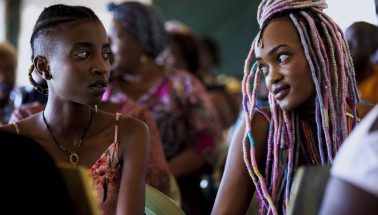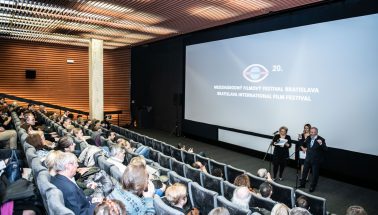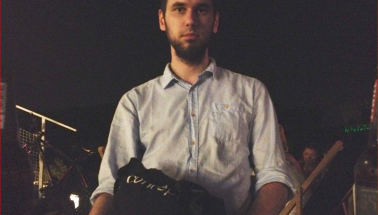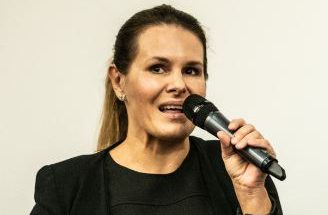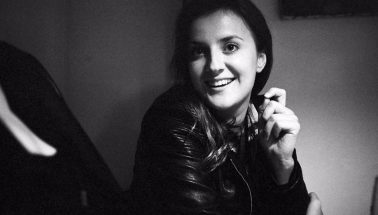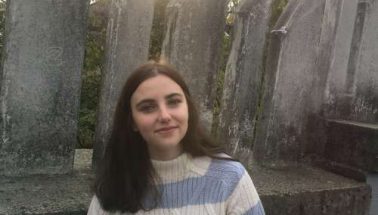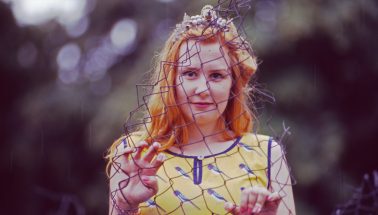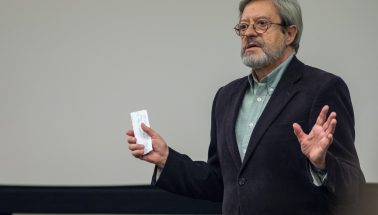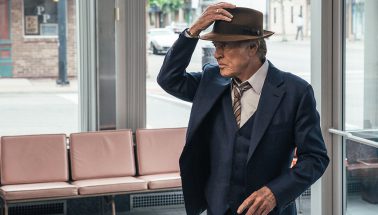Film festival: “It’s a bit like a vacation full of stories”
Alena Sabuchová is a young Slovak author and screenwriter. For her debut collection of short stories Back rooms, Alena was awarded the Ivan Krasko Prize for the best Slovak-language debut as well as the Tatra banka Foundation Young Artist Award in the category of literature. She writes scripts for television and radio, and is currently working on her second book, which will be published next year.
When a free moment pops up in her hectic freelancer life, she likes to spend it talking with her friends, with a cup of strong coffee and a good meal, with books she carries everywhere, but she is also fascinated by film. Good film.
Ali, to me, you are a perfect embodiment of today’s femme fatale – a young, elegant, cultured woman with her own view of the world, the strength to look for the beauty and quality in it, as well as the determination to fight against its dishonesty. All this while staying on top of things, with humour and charm. I consider you to be a very inspiring person, perhaps even as an influencer. That is why I am interested in your view of the present. Why do you feel that cultural events (be it festivals or going to the cinema, theatre, concerts, exhibitions, etc.) are important and should be supported?
Thank you very much for this extensive compliment, it’s probably going to take me a while to process, especially today, when earlier I walked out of my apartment to pick up my takeaway delivery with bronchitis, messy hair and in my pj’s. The courier must have thought – more femmes fatales like this! I wouldn’t say I’m an influencer either. My Instagram account is set to private and I can’t really use filters to make the pictures of my food look good, so I don’t think I deserve the label J But let’s get back to the question. I think that culture and art are of great importance in the cultivation and formation of society. It teaches people to ask, think, search for answers, dig in the past and present, and compare. The aesthetic experience, the catharsis, the feeling or the experience that they carry with them is also significant. Last but not least, it’s about sharing the experience with others – going to the cinema, a festival, or a concert incites discussion, exchange of views and plurality of insights. We also need to support them because that way we can support the creators themselves. Without audience, culture or art would be of little importance.
You studied screenwriting and dramaturgy at the Academy of Performing Arts in Bratislava and before that cultural studies at the Faculty of Arts of Comenius University and Charles University in Prague. You have been working with art for a long time. How do you choose what films you want to see?
I always say that film is about chemistry. Okay, I say that probably about everything, but often things have to work on some essence, on something you maybe can’t knowingly grasp or name, but want to experience. Sometimes, of course, a good script or theme is enough. Or music. Or the right mix of all these. Sometimes the director’s name is a guarantee. For example, that of Jim Jarmusch has not disappointed me once.
Sometimes the story doesn’t need to be a grand one. It’s enough to tell it well. And that, for example, is something the already mentioned Jarmusch knows how to do. To me, a good film means that I don’t want to check my phone for new e-mails when I’m in the screening room, or look at the watch to see how much time until it’s over. A good film is one that I will talk about, because I didn’t forget it the next day. A significant of a good film is a memorable emotion, an image that will randomly pop up in my mind weeks after I’ve seen the film.
Do you need to see it in the cinema or will a laptop do?
There are films that ask for a big screen and deserve it. For example, the latest Gaspar Noé wasn’t made for a 13-inch screen. And I must admit, even though I was crazy tired at the premiere and almost fell asleep, it was a very strong experience and I went to see it again. In the cinema. However, there are, of course, more chamber films or older films you can watch even at home, lying on your sofa, and that’s okay. Or you want to see a blockbuster but aren’t yearning for the multiplex experience and popcorn-chewing crowds.
Why do you think it’s worth going to a film festival?
Ever since university, film festivals have been an experience for me. An experience of perception, getting to know films, people and creators. Personally, they give me an overview in one place at a particular time. I remember when we as students watched one film after another and didn’t even read their catalogue annotations. Since we had the time, we’d pick films at random. Sometimes we didn’t quite hit the spot, sometimes we saw films we wouldn’t have watched had we read the synopses. To this day, a film festival is part of my work, but even from the visitor’s side – I’m fascinated by the atmosphere it creates. It’s a bit like a vacation full of stories.
I’m assuming you have already peeked in the festival programme. Try to give our viewers your tips on what to see.
Winter Flies is a film I can’t miss, since I’m a big fan of stories with child protagonists, but also because it looks like a really good road movie. I look forward to seeing Girl about a boy who feels he was born into the wrong body and wants to become a ballet dancer. I am also curious about the film Putin’s Witnesses, which was a made-to-order film commissioned to the director Mansky shortly after Putin came to power. The Romanian film “I Do Not Care If We Go Down in History as Barbarians” tells the story of a young artist who is trying to shed light on the crimes of the Romanian army, but is met with no appreciation or understanding. I also look forward to Rafiki. It looks like a film about Africa as we don’t often see it. And if there’s enough time, I’ll also watch Knife + Heart with Vanessa Paradis to spice it up with a bit of tension.
Thank you for the interview.
And see you in the cinemas!
Anna Kačincová Predmerská

